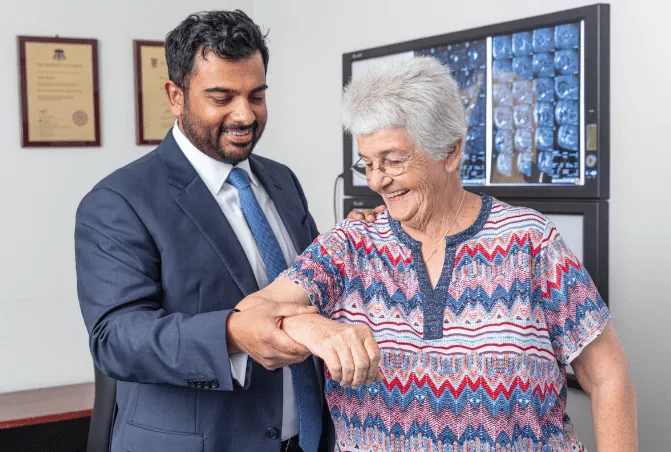Shoulder Replacement Conditions
What is a Shoulder replacement?
Much like other joint replacements, the damaged parts of the shoulder are replaced or resurfaced with artificial components. Shoulder replacements work well at relieving pain, restoring function and movement to a damaged or worn shoulder.
Who gets Shoulder replacements?
The most common indications for shoulder replacements are:
- Shoulder Arthritis.
- Irreparable Rotator Cuff Tears.
- Shoulder Fractures.
For all these conditions the goal of replacing the shoulder is to improve your quality of life by relieving pain and improving movement of the shoulder.
Book an Appointment Today!
What is Shoulder Arthritis?
Shoulder Arthritis is damage to the cartilage surface of the shoulder joint. This can either be on the ball, the socket or both sides of the joint. This is usually caused by “wear and tear” or injuries. Cartilage provides a smooth and soft surface for the bones to glide upon in the joint, as this wears away the bone rubs on bone, “bone on bone arthritis”, which causes pain and stiffness.
Once the cartilage is damaged or worn away there is no way to recover or bring back the cartilage. This will only continue to worsen over time with pain and stiffness progressively getting worse.

What are the Symptoms of Shoulder Arthritis?
The most common symptoms of Shoulder Arthritis are shoulder pain and stiffness. The pain maybe constant, present at rest and particularly worse at night time. The stiffness can vary in severity and may be associated with “crepitus” with movement of the shoulder.
How do you Diagnose Shoulder Arthritis?
Diagnosis is based on your symptoms, clinical examination of your shoulder and radiological imaging of the shoulder. Usually an X-ray will show moderate to severe shoulder arthritis, but an MRI or CT scan may be necessary to evaluate cartilage wear in mild cases.
Shoulder Replacement Treatments
View the treatments for Shoulder Replacement that our Doctors recommend
